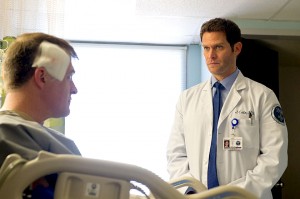
The plot of “Do No Harm,” NBC’s newest drama and the most recent spawn of the classic Dr. Jekyll and Mr. Hyde story, is as dissociative as its main character. The overused plot leaves little to the imagination and audiences will be unimpressed by the unoriginality.
The plot follows Jason Cole (Steven Pasquale, “Rescue Me”), head of neurology at a Philadelphia hospital, who is struggling with quite the inner demon in his alter ego Ian. Cole is purported to have Dissociative Identity Disorder, commonly referred to as multiple personalities. However, rather than acting like a man struggling with mental illness, Pasquale plays Cole more like Bruce Banner fighting the Hulk within.
The latest medical drama is not really a medical drama at all: Despite following a familiar formula and containing elements similar to “House” and “Grey’s Anatomy,” this is no typical procedural. From the beginning, frenetic cinematography is used to symbolize the chaos inside the protagonist (or anti-hero, depending on which manifestation he’s in). Unfortunately, this technique is not just employed in the beginning—the entire show lacks cohesiveness, avoiding transitions completely and instead jumping from scene to scene erratically.
The pilot episode demonstrates a great effort to establish the tension between Jason and Ian. Each speaks of the other as a detached third person, as if they did not share a body at all. Jason is portrayed as the type-A “good guy” trying to make up for the mistakes of his past with acts of charity. Ian, on the other hand, is a drug-abusing womanizer with violent tendencies and Jason resorts nightly to strong—and experimental—medications to prevent Ian’s reappearance.
“Do No Harm” meanders around, wandering away from and back to the plotline, apparently at random. There are plenty of twists, but the effort is seriously lacking in structure. The real procedural drama here is the slow revelation of clues as to Jason and Ian’s backstory. Details are ample but do not add much to the story—the audience knows, for example, that Ian comes at 8:25 p.m. each night and leaves at 8:25 a.m. the next morning.
Characterization is stronger in all characters aside from Dr. Cole. Supporting actresses Alana de la Garza (“CSI: Miami”) and Phylicia Rashad (“The Cosby Show”) as the new love interest and domineering boss, respectively, act with more conviction than the supposed lead. Rashad in particular is the diamond in the rough of this story—portraying a slightly corrupt hospital bureaucrat, she easily captures more attention than Pasquale does.
The writers seem to be trying to cast Jason Cole as a superhero of the Marvel or DC variety, but the most interesting moments are when Pasquale plays the sadistic, crazed Ian. Pasquale delights in this persona, reminiscent of Jack Nicholson in “The Shining.” Whether this will be an “antihero” series in the likes of “Dexter” is yet to be determined—there is too much bouncing off the walls to form anything more than snapshots of the show.
Another weakness of the show is the lack of dialogue. For a supposedly character-driven TV drama, there is little conversation and what little there is remains weak. Pasquale is not as convincing as Cole as he is as Ian; overacting runs rampant both in the leads and supporting roles. Finally, after only half an episode, the numerous subplots become hard to follow.
There is some promise in the intrigue of what Ian will do next and how Cole will attempt to control the damage. However the shortcomings make “Do No Harm” a tired, rehashed version of the original Robert Louis Stevenson story “Strange Case of Dr. Jekyll and Mr. Hyde.”











